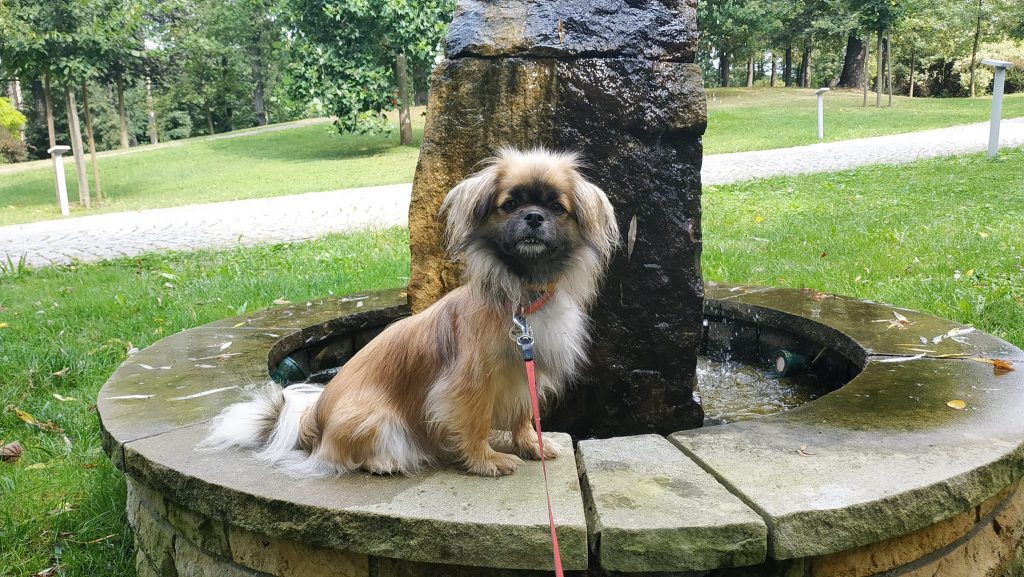Introduction
The Tibetan Spaniel is a charming small breed originating from Tibet, where it served as both a companion and a watchdog. Renowned for its friendly and intelligent demeanor, this breed is a delightful addition to various households. With its unique blend of independence and affection, the Tibetan Spaniel makes an excellent pet for families, singles, and elderly individuals alike. This guide will delve into the breed’s characteristics, care requirements, and answer some frequently asked questions to help you decide if a Tibetan Spaniel is the right fit for you.
Quick Facts Summary
- Group: Toy
- Height: 9-12 inches (23-30 cm)
- Weight: 9-15 pounds (4-6.8 kg)
- Coat Type and Colors: Double coat, with colors including black, white, gold, and various shades of brown.
- Lifespan: 12-15 years
- Temperament: Friendly, intelligent, playful, protective
- Hypoallergenic Status: No
- Origin: Tibet
Origin and History
The Tibetan Spaniel has a rich history dating back over a thousand years in the Himalayan mountains of Tibet. Originally bred by Buddhist monks, these small dogs were not only cherished companions but also served as vigilant watchdogs. Their primary role was to alert the monks to any intruders, barking from monastery walls to protect the sacred spaces. The breed’s noble appearance and loyal nature made them highly valued in Tibetan culture, and they were often given as gifts to emperors and other dignitaries.
Physical Traits and Appearance
Size and Build
Tibetan Spaniels are small dogs with a sturdy build. They typically stand between 9 and 12 inches tall at the shoulder and weigh between 9 and 15 pounds. Despite their small stature, they possess a well-proportioned frame that contributes to their agile and lively demeanor.
Coat and Colors
The breed’s double coat is one of its most distinguishing features. The outer layer is long and silky, while the undercoat is soft and dense. Common colors include black, white, gold, and various shades of brown. Regular grooming is necessary to keep the coat free from tangles and mats.
Distinctive Features
One of the Tibetan Spaniel’s most striking features is its “lion’s mane” of fur around the neck, which adds to its regal appearance. They have a distinctive face with large, expressive eyes and a well-defined muzzle. Their ears are medium-sized and set high, contributing to their alert expression.
Temperament and Behavior
Personality Traits
Tibetan Spaniels are known for their friendly and affectionate nature. They are intelligent and playful, enjoying a good game or interactive playtime with their owners. Despite their small size, they possess a strong sense of independence and can be quite stubborn. Their protective instincts make them excellent watchdogs, alerting their owners to any unusual activity.
Interaction with Children, Pets, and Strangers
Tibetan Spaniels are generally good with children, especially if they are raised with them from a young age. They can be social with other pets but may exhibit a preference for familiar animals over new ones. They are cautious with strangers, often taking time to warm up before showing their true friendly nature.
Trainability and Intelligence
While Tibetan Spaniels are intelligent and quick learners, their independent streak can make training a challenge. Consistent and positive reinforcement methods work best, as they may resist commands if they do not see an immediate benefit. Patience and persistence are key when training this breed.
Health and Wellness
Common Health Issues
Tibetan Spaniels are generally healthy dogs, but they can be prone to certain health conditions. Common issues include patellar luxation (dislocated kneecap) and respiratory problems due to their brachycephalic (short-nosed) structure. Regular veterinary checkups and preventive care are essential to maintaining their health.
Health Checks and Screenings
Routine health screenings for patellar luxation and respiratory conditions are recommended. Regular dental checkups and vaccinations are also important to ensure overall health and well-being.
Diet and Nutrition
A balanced diet is crucial for maintaining the Tibetan Spaniel’s health. High-quality dog food with appropriate levels of protein, fats, and vitamins is recommended. Portion control and avoiding overfeeding can help prevent obesity, a common issue in small breeds.
Grooming and Maintenance
Coat Care
The Tibetan Spaniel’s coat requires regular grooming to keep it in top condition. Brushing a few times a week helps prevent matting and tangles. Regular baths and occasional visits to a professional groomer can help maintain the coat’s health and appearance.
Skin, Ear, Eye, and Dental Care
Regular checks of the skin, ears, and eyes are important to prevent infections and other issues. Cleaning the ears and teeth regularly can help prevent health problems. The breed’s eyes should be monitored for signs of irritation or infection.
Hypoallergenic Potential
Tibetan Spaniels are not considered hypoallergenic. Their double coat can shed, which may trigger allergies in sensitive individuals.
Exercise and Activity Requirements

Exercise Needs
Tibetan Spaniels have moderate exercise needs. They enjoy daily walks and playtime but do not require extensive physical activity. Engaging in activities such as fetch or agility training can help keep them physically and mentally stimulated.
Mental Stimulation
Mental stimulation is important for this intelligent breed. Puzzle toys, interactive games, and training exercises can help keep their minds sharp and prevent boredom.
Lifestyle Compatibility
Living Conditions
Tibetan Spaniels are adaptable to various living conditions. They are well-suited for apartment living due to their small size, but they also enjoy having access to a yard for playtime. They adapt well to different environments as long as their exercise and socialization needs are met.
Compatibility with Different Lifestyles
The breed is versatile and can fit into various lifestyles. Whether you are a busy professional, an active individual, or a family with children, the Tibetan Spaniel can adapt to your routine. They do best with owners who can provide consistent companionship and care.
Weather Adaptability
Tibetan Spaniels can adapt to a range of climates. However, they should be protected from extreme weather conditions, especially heat, due to their dense coat.
Adoption, Buying, and Ethical Considerations
Finding a Reputable Breeder or Rescue
When looking for a Tibetan Spaniel, it’s important to find a reputable breeder or rescue organization. Look for breeders who prioritize the health and well-being of their dogs and provide proper documentation. Consider adopting from a rescue group to give a deserving dog a new home.
Adoption Tips
Adoption involves considering the dog’s health, temperament, and compatibility with your lifestyle. Be prepared for an adoption fee and ensure that you are ready for the responsibilities of pet ownership.
Puppy Mills and Scams
Avoid puppy mills and unethical breeders by doing thorough research. Be wary of deals that seem too good to be true and always visit the breeder’s facilities in person.
Pros and Cons of Tibetan Spaniels
Pros
- Friendly and Affectionate
- Tibetan Spaniels are known for their loving and affectionate nature. They form strong bonds with their families and enjoy spending time with their owners, making them great companions.
- Intelligent and Trainable
- This breed is intelligent and quick to learn, which can make training easier. They enjoy engaging with their owners in training sessions and can pick up commands and tricks relatively quickly.
- Good Watchdogs
- Tibetan Spaniels have a natural instinct to protect their home and family. They are alert and will bark to alert their owners of any unusual activity, making them effective watchdogs.
- Adaptable to Various Living Conditions
- They adapt well to different living environments, including apartments and houses with yards. Their small size makes them suitable for urban living as long as their exercise needs are met.
- Playful and Energetic
- Despite their small size, Tibetan Spaniels have a playful and energetic personality. They enjoy interactive play and can be quite entertaining with their playful antics.
- Low Exercise Requirements
- While they are active and enjoy playtime, their exercise needs are moderate. Regular walks and play sessions are usually sufficient to keep them healthy and happy.
- Good with Children and Other Pets
- When properly socialized, Tibetan Spaniels can be good with children and other pets. They often enjoy the company of both, though they may be selective with new animals and people.
Cons
- Stubborn and Independent
- Tibetan Spaniels have a strong independent streak and can be quite stubborn. This trait can make training more challenging, as they may resist commands or act on their own terms.
- Regular Grooming Needed
- Their double coat requires regular grooming to prevent matting and tangles. This means frequent brushing and occasional professional grooming are necessary to keep their coat in good condition.
- Not Hypoallergenic
- Tibetan Spaniels are not considered hypoallergenic. Their shedding can trigger allergies in sensitive individuals, so they may not be the best choice for those with severe allergies.
- Health Concerns
- Like all breeds, Tibetan Spaniels are prone to certain health issues, including patellar luxation and respiratory problems. Regular veterinary care and attention to their health are essential.
- Can Be Reserved with Strangers
- While loyal to their families, Tibetan Spaniels can be reserved or cautious around strangers. They may take time to warm up to new people, which can be a challenge for those looking for an immediately sociable dog.
- Sensitive Stomach
- Some Tibetan Spaniels have sensitive stomachs, which can lead to digestive issues. Careful attention to their diet and choosing easily digestible food can help manage this problem.
- Potential for Separation Anxiety
- Due to their strong attachment to their families, Tibetan Spaniels may experience separation anxiety if left alone for long periods. This can lead to destructive behavior or excessive barking.
Similar Breeds
If you’re considering other breeds similar to the Tibetan Spaniel, you might also look into:
- Pekingese: Another small breed with a similar appearance and temperament.
- Shih Tzu: Known for its friendly nature and similar grooming needs.
- Pomeranian: A small, fluffy breed with a playful personality.
FAQs
Is a Tibetan Spaniel a good family dog?
Yes, Tibetan Spaniels can make excellent family dogs. They are generally good with children and other pets, especially if properly socialized.
Why are Tibetan Spaniels rare?
Tibetan Spaniels are relatively rare due to their specialized breeding and historical origins. They are not as common as some other toy breeds, but their unique traits make them a cherished choice for those who know of them.
Do Tibetan Spaniels bark a lot?
Tibetan Spaniels are known for their alertness and may bark to alert their owners of unusual activity. They are not excessively noisy but can be vocal when they sense something out of the ordinary.
Are Tibetan Spaniels cuddly?
Yes, Tibetan Spaniels can be quite affectionate and enjoy cuddling with their owners. They form strong bonds with their families and seek out attention and affection.
Expert Insights
Dr. Jane Smith, a veterinarian with over 20 years of experience, notes, “Tibetan Spaniels are a wonderful breed for families who appreciate their unique blend of independence and loyalty. Regular grooming and attention to their health needs are essential for their well-being.”
Related Tips and Advice
Training and Socialization
Start training and socialization early to help your Tibetan Spaniel become a well-adjusted and obedient companion. Positive reinforcement and patience are key.
Health and Safety Tips
Ensure regular veterinary checkups to monitor for common health issues. Maintain a balanced diet and provide regular exercise to keep your Tibetan Spaniel healthy and happy.
Conclusion
The Tibetan Spaniel is a delightful and intelligent breed that can bring joy to various types of households. With proper care, training, and attention, they make loving and loyal companions. If you’re considering adding a Tibetan Spaniel to your family, make sure you are prepared for their grooming needs and unique personality traits. Explore adoption options or find a reputable breeder to start your journey with this charming breed.




